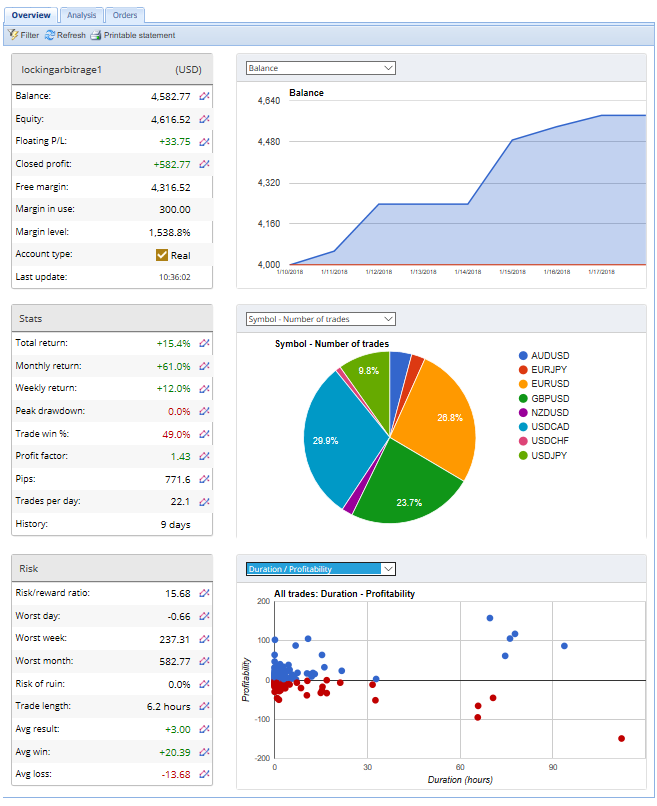Our company came about in 2000, and by 2005 we had created our first arbitrage robot. We can be rightly called a pioneer in the development of arbitrage systems and of software for the forex market, and we are certainly more than qualified to provide unique insights into the world of arbitrage and forex trading.
Based on the experience of our company, I have concluded that arbitrage trading is the most profitable and least risky kind of trading available to traders. It also happens to be the most promising one.
There are several myths associated with arbitrage trading. These myths need to be debunked, and I will attempt to do just that.
The first myth is that arbitrage trading is illegal. This myth has been created by unscrupulous brokers and continues to be cultivated by them because it serves one of their objectives – to help you part with your deposit. And the truth? Here’s what Investopedia has to say about the topic in a relevant article: Arbitrage is the exploiting of price discrepancies within different markets of a similar or identical assets in order to generate low-risk to no-risk profits, after accounting for transaction and information costs. Arbitrage trading is not only legal in the United States, but should be encouraged, as it contributes to market efficiency. Furthermore, arbitrageurs also serve a useful purpose by acting as intermediaries, providing liquidity in different markets. “Read more: Why Is Arbitrage Trading Legal? | Investopedia https://www.investopedia.com/articles/investing/032615/why-arbitrage-trading-legal.asp#ixzz54YOIO8B3
If a broker explicitly forbids the use of arbitrage trading, it means that that broker makes active use of the B-book, and that its technology is not sufficiently developed to detect arbitrage trading and switch your trading to the A-book. It might also mean that the broker works exclusively with the B-book.
It is pointless to trade with such brokers when you use ordinary latency arbitrage, since it makes it easy for the broker to refuse to hand over to you your trading gains – the broker will simply use your short-term profits of 1-2 pips as a pretext to enforce the “no arbitrage trading” clause. However, by using locking arbitrage strategy or hedge arbitrage strategy, you will increase the duration of your orders to several hours and your profits to double-digit pips.
The illustration below shows the trading results obtained by using locking arbitrage. You can see that the order duration varies from several minutes to several hours, and that the profit on the trades varies from single-digit pips to 180 pips. Additionally, the software can be adjusted to produce more conservative numbers – for example, in case the broker requires minimal order duration of several minutes.

Using this method will make it difficult for the broker to withhold your profits. Should the broker still decide to give it a try and send you a letter advising you that you used bogus prices and damaged the broker’s server, you should let the broker know you will take the matter up with the regulator and, if necessary, make good on the promise.
Our clients have experienced instances of this; in 99.9% of all cases, the outcome was in the client’s favor.
Speaking of brokers’ servers, another myth associated with arbitrage trading is that such trading damages them.
Here is a simplified illustration of the typical communication flow of an STP (DMA) broker:
In other words, if you send, say, an order to buy EURUSD at 1.34569 and the liquidity provider confirms the order at 1.23570, this order will be executed on the server with a price of 1.23570 and a slippage of 1, and displayed on your terminal. I am thoroughly familiar with the way servers work; I am also familiar with many bridges – sufficiently familiar to tell you that arbitrage trade will not be detrimental in any way to a true STP broker and its bridge. The broker will pocket its commission fees regardless and be quite content.
You have to understand that your actions here are absolutely legal, and you’re not breaking any rules.
What does your broker know about your trading? A myth exists according to which your broker knows everything about your trading. That is far from true. Let’s take a closer look.
Does the broker see the IP address you’re using to trade? It is visible in the administrator log.
However, most brokers do not have white labels; they only have the manager, the rights of which can be severely curtailed.
Can the broker see the magic numbers and comments you use, and whether you’re trading manually or with the help of an expert advisor?
While the broker has access to this information through the manager, if you use manual emulation, the broker will only see that you’re trading manually.
The illustration below shows a screenshot of an administrator account in which locking arbitrage software with manual emulation is used for trading.The broker does not see the magic number and identifies all account activity as manual trading. Bear in mind that the comment should always be unique. Any comment already in use should be changed to your own.
Possibly the most common myth centers on the coming demise of arbitrage trading. We first heard that arbitrage trading would soon die when we created our first arbitrage robot. It’s now been more than ten years, and our clients are still making money by using arbitrage advisors. Although it’s true that brokers are constantly coming up with new plugins to hinder arbitrage trading, arbitrage robot developers have no difficulty keeping up.

